热词翻译:“互相尊重主权和领土完整、互不侵犯、互不干涉内政、平等互利、和平共处”英文怎么说?
“互相尊重主权和领土完整、互不侵犯、互不干涉内政、平等互利、和平共处”英文怎么说?
根据热词译领导讲话翻译数据库,在《弘扬和平共处五项原则 携手构建人类命运共同体》的翻译中,“互相尊重主权和领土完整、互不侵犯、互不干涉内政、平等互利、和平共处”被翻译为:
互相尊重主权和领土完整、互不侵犯、互不干涉内政、平等互利、和平共处
mutual respect for sovereignty and territorial integrity, mutual non-aggression, mutual non-interference in each other’s internal affairs, equality and mutual benefit, and peaceful coexistence
mutual respect for sovereignty and territorial integrity, mutual non-aggression, mutual non-interference in each other’s internal affairs, equality and mutual benefit, and peaceful coexistence
例句如下:
和平共处五项原则的创立是时代的呼唤、历史的选择。第二次世界大战结束后,民族独立和解放运动风起云涌,世界殖民体系土崩瓦解。同时,冷战阴云笼罩世界,“强权即公理”甚嚣尘上。刚刚获得独立的新生国家渴望维护国家主权、发展民族经济。新中国坚持独立自主,积极谋求同世界各国和平共处,努力改善外部环境尤其是周边环境。在此背景下,中国领导人首次完整提出互相尊重主权和领土完整、互不侵犯、互不干涉内政、平等互利、和平共处五项原则,并将其纳入中印、中缅联合声明,共同倡导将五项原则确立为指导国家间关系的基本准则。
The Five Principles of Peaceful Coexistence answered the call of the times, and its initiation was an inevitable historic development. In the wake of the Second World War, national independence and liberation movements swept across the globe, and the colonial system around the world crumbled and collapsed. At the same time, the world was overshadowed by the dark clouds of the Cold War and menaced by the rampant clamors that “Might is right.” Newly independent countries aspired to safeguard their sovereignty and grow their national economy. New China followed the principle of independence, actively sought peaceful coexistence with all countries, and endeavored to improve its external environment, especially in its neighborhood. Against this backdrop, the Chinese leadership specified the Five Principles in their entirety for the first time, namely, mutual respect for sovereignty and territorial integrity, mutual non-aggression, mutual non-interference in each other’s internal affairs, equality and mutual benefit, and peaceful coexistence. They included the Five Principles in the China-India and China-Myanmar joint statements, which jointly called for making them basic norms for state-to-state relations.
The Five Principles of Peaceful Coexistence answered the call of the times, and its initiation was an inevitable historic development. In the wake of the Second World War, national independence and liberation movements swept across the globe, and the colonial system around the world crumbled and collapsed. At the same time, the world was overshadowed by the dark clouds of the Cold War and menaced by the rampant clamors that “Might is right.” Newly independent countries aspired to safeguard their sovereignty and grow their national economy. New China followed the principle of independence, actively sought peaceful coexistence with all countries, and endeavored to improve its external environment, especially in its neighborhood. Against this backdrop, the Chinese leadership specified the Five Principles in their entirety for the first time, namely, mutual respect for sovereignty and territorial integrity, mutual non-aggression, mutual non-interference in each other’s internal affairs, equality and mutual benefit, and peaceful coexistence. They included the Five Principles in the China-India and China-Myanmar joint statements, which jointly called for making them basic norms for state-to-state relations.
热词链接
“互相尊重主权和领土完整、互不侵犯、互不干涉内政、平等互利、和平共处”在其他来源中的翻译:
1 《2024年6月25日外交部发言人毛宁主持例行记者会》中“互相尊重主权和领土完整、互不侵犯、互不干涉内政、平等互利、和平共处”的翻译
毛宁:今年是和平共处五项原则发表70周年。70年前,周恩来总理首次完整提出“互相尊重主权和领土完整、互不侵犯、互不干涉内政、平等互利、和平共处”五项原则。70年来,和平共处五项原则被世界各国普遍接受和认可,成为国际关系基本准则和国际法基本原则。
Mao Ning: This year marks the 70th anniversary of the Five Principles of Peaceful Coexistence. Seven decades ago, Premier Zhou Enlai put forth those five principles in their entirety for the first time—“mutual respect for sovereignty and territorial integrity, mutual non-aggression, mutual non-interference in each other’s internal affairs, equality and mutual benefit, and peaceful coexistence.” Over the 70 years that followed, the Five Principles of Peaceful Coexistence have been widely accepted and recognized by countries across the world. They have become part and parcel of the fundamental norm governing international relations and basic principles of international law.
Mao Ning: This year marks the 70th anniversary of the Five Principles of Peaceful Coexistence. Seven decades ago, Premier Zhou Enlai put forth those five principles in their entirety for the first time—“mutual respect for sovereignty and territorial integrity, mutual non-aggression, mutual non-interference in each other’s internal affairs, equality and mutual benefit, and peaceful coexistence.” Over the 70 years that followed, the Five Principles of Peaceful Coexistence have been widely accepted and recognized by countries across the world. They have become part and parcel of the fundamental norm governing international relations and basic principles of international law.
2 《王毅在金砖国家同发展中国家外长对话会上的发言》中“互相尊重主权和领土完整、互不侵犯、互不干涉内政、平等互利、和平共处”的翻译
第三,要坚持公平正义,完善全球治理。70年前,和平共处五项原则在新兴力量发展崛起的历史潮流中应运而生。“互相尊重主权和领土完整、互不侵犯、互不干涉内政、平等互利、和平共处”,成为国际社会尤其是发展中国家共同遵循的国际关系准则。历史启迪我们,顺应时代潮流,才能得民心,更能利天下。坚持国际关系基本准则,才能行得稳,更能走得远。
Third, we should uphold fairness and justice and improve global governance. Seventy years ago, the Five Principles of Peaceful Coexistence were proposed amid the historic rise of emerging forces. The principles of mutual respect for sovereignty and territorial integrity, mutual non-aggression, mutual non-interference in each other’s internal affairs, equality and mutual benefit, and peaceful coexistence have become norms governing international relations observed by the international community, especially by developing countries. What we learn from history is that only by following the trend of the times can we get the people’s support and bring benefits to all, and only by following the basic norms governing international relations can we make steady and sustained progress.
Third, we should uphold fairness and justice and improve global governance. Seventy years ago, the Five Principles of Peaceful Coexistence were proposed amid the historic rise of emerging forces. The principles of mutual respect for sovereignty and territorial integrity, mutual non-aggression, mutual non-interference in each other’s internal affairs, equality and mutual benefit, and peaceful coexistence have become norms governing international relations observed by the international community, especially by developing countries. What we learn from history is that only by following the trend of the times can we get the people’s support and bring benefits to all, and only by following the basic norms governing international relations can we make steady and sustained progress.
3 《习近平在法国媒体发表署名文章》中“互相尊重主权和领土完整、互不侵犯、互不干涉内政、平等互利、和平共处”的翻译
今年是和平共处五项原则发表70周年。70年前,周恩来总理首次完整提出“互相尊重主权和领土完整、互不侵犯、互不干涉内政、平等互利、和平共处”五项原则。70年来,和平共处五项原则被世界各国普遍接受和认可,成为现代国际关系重要准则。
This year marks the 70th anniversary of the Five Principles of Peaceful Coexistence. Seven decades ago, Chinese Premier Zhou Enlai put forth in full the five principles for the first time—“mutual respect for sovereignty and territorial integrity, mutual non-aggression, mutual non-interference in each other’s internal affairs, equality and mutual benefit, and peaceful coexistence.” Through 70 years, the Five Principles of Peaceful Coexistence have been widely accepted and recognized by countries across the world. They have become an important norm governing contemporary international relations.
This year marks the 70th anniversary of the Five Principles of Peaceful Coexistence. Seven decades ago, Chinese Premier Zhou Enlai put forth in full the five principles for the first time—“mutual respect for sovereignty and territorial integrity, mutual non-aggression, mutual non-interference in each other’s internal affairs, equality and mutual benefit, and peaceful coexistence.” Through 70 years, the Five Principles of Peaceful Coexistence have been widely accepted and recognized by countries across the world. They have become an important norm governing contemporary international relations.

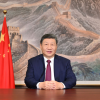 国家主席习近平发表二〇二六年新年贺词
国家主席习近平发表二〇二六年新年贺词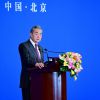 在历史演进重大关头开拓中国特色大国外交新境界
在历史演进重大关头开拓中国特色大国外交新境界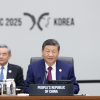 习近平在亚太经合组织第三十二次领导人非正式会议第一阶段会议上的讲话
习近平在亚太经合组织第三十二次领导人非正式会议第一阶段会议上的讲话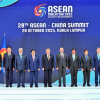 李强在第28次中国—东盟领导人会议上的讲话
李强在第28次中国—东盟领导人会议上的讲话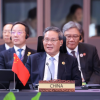 李强在第20届东亚峰会上的讲话
李强在第20届东亚峰会上的讲话